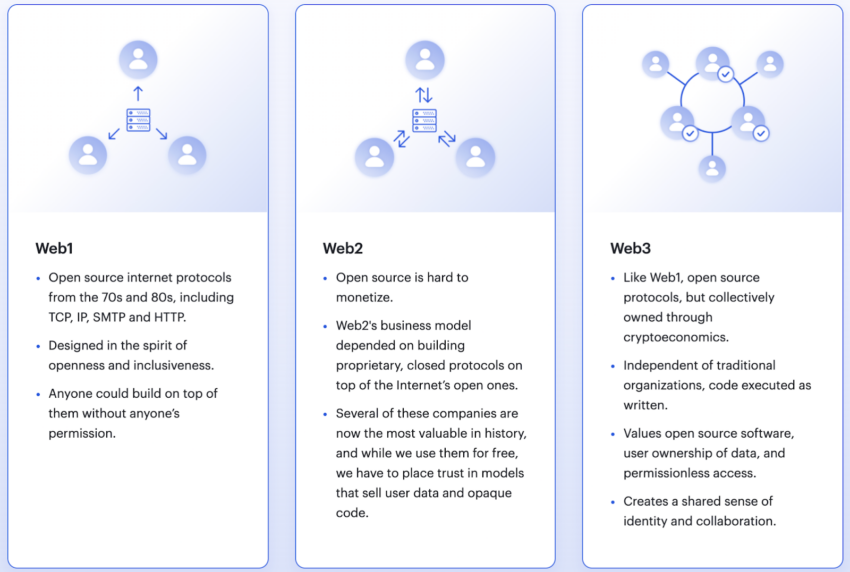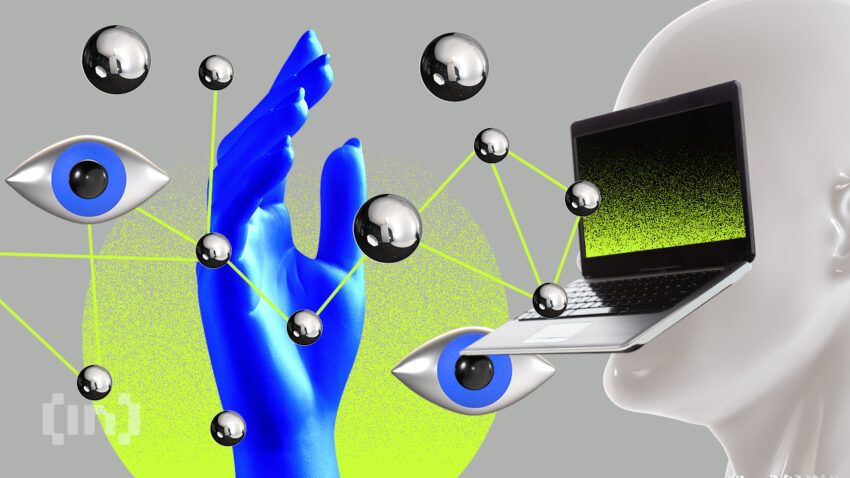Web3 is set to revolutionize how we interact and transact online in the fast-paced digital world. With its decentralized approach and emphasis on privacy, security, and ownership, web3 hopes to give internet users a new era of freedom and empowerment.
But as with any new technology, there are challenges to overcome. In this article, we delve into the exciting possibilities and tough realities of web3, examining the opportunities and challenges ahead on this new frontier.
What is Web3?
Web3 refers to the next generation of the internet—one that focuses on decentralization and user control. Unlike web2, which is centered around centralized platforms like Facebook and Google, web3 allows for a more democratic and transparent internet.
Web3 is built on blockchain technology, which provides a secure, decentralized ledger for data and transactions. This means that instead of relying on a single entity to manage data and transactions, web3 utilizes a network of nodes to maintain the system’s integrity.
What’s Wrong with Web2?
Web2 has brought about many conveniences, but it has also created several issues. For example, user data is often monetized and sold to third-party advertisers, resulting in a loss of privacy.
Additionally, centralization has led to a concentration of power and control in the hands of a few big tech companies. This centralization makes it easier for these companies to manipulate information and restrict access, leading to concerns over censorship and freedom of speech.
The Benefits of Web3
Web3 aims to address these issues by putting the power back in the hands of the users. With a decentralized network, there is no single point of control, making it much harder for any one entity to manipulate the system. Additionally, users have control over their own data and can choose to share it or keep it private, restoring privacy.
One of the key benefits of web3 is the creation of a more transparent and fair marketplace. For example, in the world of web3, users can earn rewards for providing valuable content, as opposed to having their data monetized and sold by centralized platforms.
Why Big Tech is Hot on Web3
With the growing interest in web3, it’s no surprise that big tech companies are starting to take notice. These companies are recognizing the potential for web3 to revolutionize the internet and are looking for ways to get involved. In other words, they smell money.
For example, companies like Meta, Google, and Microsoft have invested heavily in web3 technologies, with Meta sinking over $11B in building its version of the metaverse. These moves clearly show that these companies are looking to stay ahead of the curve and remain relevant in a rapidly changing tech landscape.
Indeed, they want to build the curve-not just stay ahead of it.
Big tech is focused on web3 for another reason: it presents a new business model. Web3 allows companies the chance to provide new and innovative services, such as decentralized finance and gaming, that centralized systems currently cannot.
Web2 vs Web3
Web2 and web3 are two distinct versions of the internet that differ in design, architecture, and capabilities. Here are some of the key pros and cons of each:
Web2
Pros:
- User-Friendly: Web2 is designed for ease of use, with intuitive interfaces and simple navigation. This makes it accessible to people of all ages and technical abilities.
- Centralized Control: Web2 is dominated by large corporations like Google and Facebook, which provides a level of centralization that makes it easier to regulate and monitor content.
- High Speed and Efficiency: Web2 is built on centralized servers, allowing for fast and efficient data processing. This makes it ideal for high-speed data transfer applications, such as streaming video and music.
Cons:
- Data Privacy Concerns: Web2 relies on centralized servers to store user data, which makes it vulnerable to data breaches and makes it easier for governments and corporations to monitor user activity.
- Limited Innovation: Web2 is dominated by large corporations, which can limit the potential for innovation and competition. This can lead to a lack of choice for users and limit the potential for new and exciting applications to emerge.
- Digital Divide: Web2 is not accessible to everyone, as access to the internet and the devices needed to use it can be expensive and limited in certain regions.

Web3
Pros:
- Decentralization: Web3 is built on decentralized technology, such as blockchain, which makes it more secure and resistant to censorship and control by a single entity.
- Data Privacy: Web3 allows users to control and secure their own data, reducing the risk of data breaches and making it more difficult for governments and corporations to monitor user activity.
- Potential for Innovation: Web3 is an open and decentralized platform that can provide new opportunities for innovation and competition, potentially leading to the development of new applications.
Cons:
- Complexity: Decentralized systems can be complex and difficult for the average user to understand and use. This can create barriers to adoption and limit the growth of decentralized systems.
- Scalability: Decentralized systems can be slow and inefficient, as they rely on a large network of nodes to process transactions. This can lead to slow transaction times and higher fees, making it difficult for decentralized systems to compete with centralized systems in terms of speed and efficiency.
- Regulation: Decentralized systems are often difficult to regulate, as they are not controlled by a single entity. This can lead to concerns over illegal activities, such as money laundering and terrorism financing, and make it difficult for governments to enforce laws and regulations.
A World Without Google?
Google revolutionized the internet in 1998 by developing a search engine that was fast, accurate, and easy to use. Google’s search algorithm, PageRank, changed that by using links between pages to rank their relevance and return more accurate results.
However, mining their personal information made users pay the cost for this convenience. Despite this, it seems unlikely that a web3 startup will replace or even diminish Google’s presence in the future.
Then again, MySpace used to be the go-to spot for social media.
It is possible that a web3 search engine could eventually replace Google, but it would likely face several challenges along the way.
Scalability and Complexity
One of the main challenges facing a web3 search engine is scalability.
As a decentralized system, it would need to process a large volume of data in real time, which can be difficult and slow compared to a centralized system like Google.
Additionally, the complexity of decentralized systems can make it difficult for users to understand and use the technology, which could limit adoption and growth.
Google is Vulnerable
However, Google is vulnerable in several ways that a web3 search engine could exploit. A single entity controls Google. This makes it a centralized system that stores user data on centralized servers. This can make it easier for governments and other entities to restrict access to information.
A web3 search engine could offer users greater privacy and control over their data. This could be a major selling point for users concerned about privacy and censorship.
Additionally, web3 search could offer users the ability to earn rewards for providing valuable content.
Who Wins?
Web2 offers a user-friendly and high-speed internet experience, but it is vulnerable to data privacy concerns and limited innovation.
On the other hand, web3 offers decentralization and potential for innovation. Yet it can be complex and slow compared to web2.
The technology is constantly evolving, and it will be interesting to see how these two versions of the internet coexist. They will undoubtedly have an impact on the way we use and experience the internet. For the time being, however, web2 still has the ‘first mover’ advantage.
Final thoughts
Web3 represents a major shift in how we think about the internet and its potential. Its focus on decentralization and user control offers a more democratic and transparent internet. Under this system, users would have greater control over their data and the system as a whole.
As web3 continues to grow and mature, we’ll likely see more and more companies jumping on board. The future of the internet looks exciting and filled with potential, and web3 is at the forefront of this change. It remains unknown how quickly that change will arrive.
Disclaimer
Following the Trust Project guidelines, this feature article presents opinions and perspectives from industry experts or individuals. BeInCrypto is dedicated to transparent reporting, but the views expressed in this article do not necessarily reflect those of BeInCrypto or its staff. Readers should verify information independently and consult with a professional before making decisions based on this content. Please note that our Terms and Conditions, Privacy Policy, and Disclaimers have been updated.


